
Creating a World of Peace - The Thought and Works of Sun Myung Moon by Joon Ho Seuk
|
|
Creating a World of Peace - The Thought and Works of Sun Myung Moon by Joon Ho Seuk |
Volume 5 - Education for a Culture of Peace [Part 3 of 5]
3. Responsibilities Of True Teachers
The Family Is the Place to Train Our Hearts
From Sun Myung Moon's Philosophy of Education, Seoul, Korea: Sunghwa Publishing Company, 2002.
Our parents at home and our teachers at educational institutions ought to be at the center of society. Parents breast feed us and rear us, both physiologically and emotionally guiding our development. Similarly, schools train us as preparation for our social lives and futures. If the family is the training ground for our aesthetic sentiments, the school is the training ground for experiences in society.
The family is the place for training our hearts.
Therefore, we have to love and live together with our brothers and sisters in schools and in the nation. Parents have to bequeath all emotional aspects to their children and successors. They have to lay the emotional foundation for their offspring by demonstrating how they should live in the family, in the society, and for the nation, just as how the parents have been living.
A. The Family and Education of Children
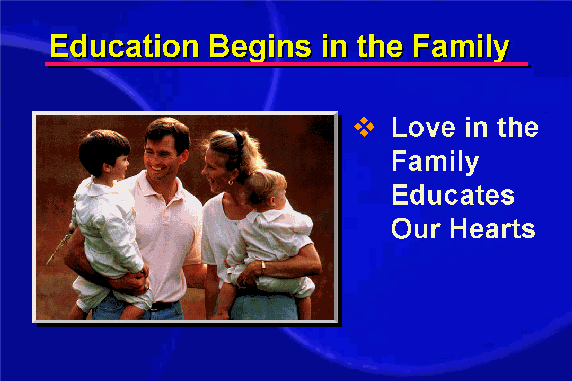
Reverend Moon's teachings consistently emphasize that God, the creator of this world, is our parent. Thus, parents are in the position representing God to their children.
God's central and most important attribute is the heart of love, and so parents are responsible to teach about love to their children. This education of heart forms the foundation for all other types of education.
After our hearts have been nourished and trained in the family, we are ready to receive education at school to prepare us to be creative contributors to society.
The Heart of Teachers
From Sun Myung Moon's Philosophy of Education, Seoul, Korea: Sunghwa Publishing Company, 2002.
Teachers should be possessed of three hearts.
First, the heart of parents; then, the heart of raising people to whom they can entrust their families eventually as their heirs; lastly, the heart of raising people who can be entrusted with the nation. Only then will the family, nation or any entity prosper. It's the same in the Kingdom of Heaven.
B. The Role of Teachers
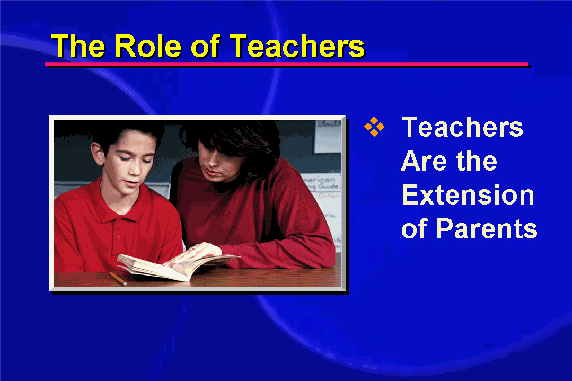
As mentioned previously, our first teachers are our parents in the family. Then we enter the gateway to society -- the school -- where we are educated by many different teachers.
Reverend Moon explains that while teachers are responsible for conveying knowledge to their students, their first job is to love them, as an extension of their parents.
Relationship between Teachers and Students
From Sun Myung Moon's Philosophy of Education, Seoul, Korea: Sunghwa Publishing Company, 2002.
Teachers should educate their students with parental love. They should teach that love is eternal. Their ties should last beyond their school days. Teachers should be unable to forget about their students for the rest of their lives. They should strive to forge such ties of love. Those who connect all their knowledge with love are true teachers.
Rather than teaching just to earn a living, they should teach out of an irrepressible love and desire to teach, even at great personal cost. Teachers and students should have such a relationship that, night or day, the teachers long to go to them and convey their knowledge eternally with love, and the students are eager to receive that teaching.
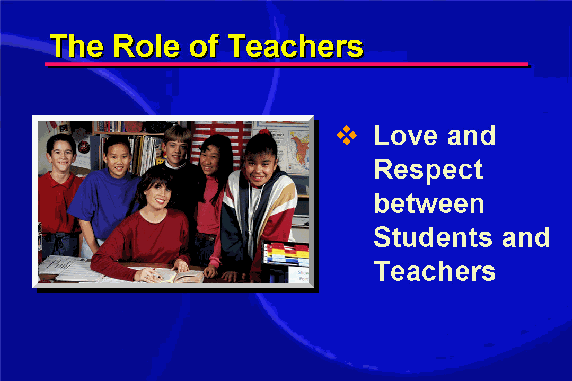
Based on this heart of love, teachers experience an intense desire to teach their students, and great joy and fulfillment as they learn. In this way, teachers educate their students to become great citizens of whom they, and their parents, will be proud.
The role of teacher carries a great responsibility. The future of society depends on our young people and the education they receive. Reverend Moon exhorts youth to be serious about their studies and to appreciate and respect the investment teachers make in their education.
Living for the Sake of Each Other
From Gathering for Reading and Learning Series, Volume 2 Part 2: Way of Unification, Washington DC: FFWPUI, 1998.
The professor shouldn't tell himself that he is great. He should live for the sake of the students; likewise, the students should live for the sake of the professor. So the movement of living for the sake of others should be diffused in the schools.
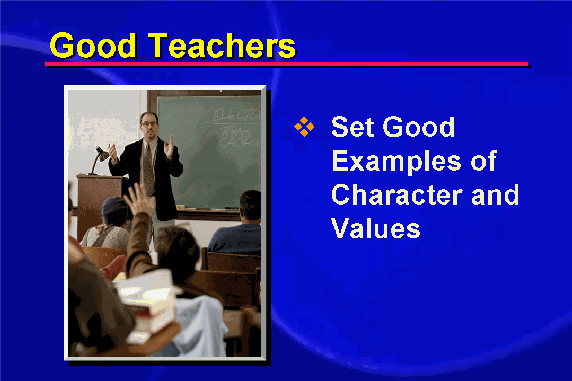
Teachers must be serious about the responsibility they have as educators. They should not be motivated by desire for power or personal reward. Their purpose is to work for the sake of their students. Likewise, students have a responsibility to study hard and complete all the assignments given by their teachers. In this way teachers and students constantly give to and receive from each other.
Good Teachers
From Gathering for Reading and Learning Series, Volume 6: The Way for Students, Washington DC: FFWPUI, 1998.
Which teacher do you like in your school? One says, "Hey guys. You don't like to study on this beautiful day. Why don't you go out and play in the field of flowers?" And the other says, "You rascals, Spring day? By no means. Study! Study!" Which teacher is better?
In your school, which is the good teacher, the teacher who strikes you, with a piece of chalk, making his eyes glare, or the teacher who takes it idly and easily in his teaching? Who is the good teacher?
As Reverend Moon has explained, education is not just about imparting knowledge but rather should balance the teaching of knowledge and technical mastery with education of character and moral values.
Thus, not only are teachers responsible for the intellectual or technical development of their students, but they also play a major role in the development of students' character and moral values. A teacher who has great intellectual knowledge but lives an immoral life may damage his students irreparably, whereas one with less academic ability but strong determination and clear values may inspire his students to fulfill their own potential and live successful and valuable lives.
Responsibility for Students' Development
From Sun Myung Moon's Philosophy of Education, Seoul, Korea: Sunghwa Publishing Company, 2002.
Professors should not only teach theory but also teach character and moral values. Professors have great influence in the shaping of students' character and their general development; therefore, they should feel responsible for the education of their students.
Through the World University Federation I believe that students will learn directly from the world's best scholars and I believe that professors will be teaching students beyond the borders of nationality. This way they will contribute far more meaningfully to the future.
C. Nature as Teacher
Reverend Moon has a great love for nature. As will be seen in the later section on his own education, Reverend Moon spent much time in nature learning many important lessons from the creation. He encourages us to learn from nature as he did, and as Adam and Eve must have done.
Nature Is Our Teacher
From "My Life," Belvedere Estate, Tarrytown, New York, March 12, 1978.
Everything is our friend; nature is our teacher.
When you see the birds singing back and forth to each other in springtime, think about you and your wife or husband, about whether you are really as good as the birds are. When birds bring food for their young all day long, you are seeing the law of love in action.
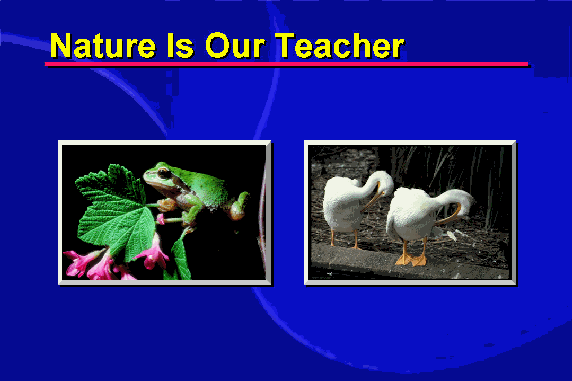
There are so many incredible creatures in our world. If we examine even one species closely we can find clues as to how we can live in harmony with each other and all of nature.
Watching a pair of birds singing to each other, building their nest, and cooperating to find food and protect their young inspires us to develop harmonious partnerships as husband and wife for the sake of our children.
Nature Is a Textbook
From "The Day of All Things," Belvedere Estate, Tarrytown, New York, June 21, 1982.
Did Adam and Eve suddenly discover that love is to be expressed by kissing and then start kissing each other, or was their discovery stimulated by the things of nature? What do you think: did they learn it or invent it? I say that they observed the animals, that nature was their teacher.
Watching nature, Adam found out that sometimes the male goes first and the female follows him, and other times the female goes first and the male follows her. But wherever they looked, they found that male and female somehow cooperate.
When the male finds good food, he signals the female to join in the meal. Did Adam and Eve invent the signals they used for each other, or did they learn them from other creatures? Each morning, birds call out to one another; the male bird sings and the female responds in harmony.
Actually, Adam and Eve learned from nature.
Nature was their best teacher. They might not have had a house like Belvedere, for instance, but they must have had some small cave or cabin. During the day, did Adam and Eve just lie around, bored to death, or were they busy and active?
They had not a moment to be bored; there was so much to look at and explore: birds, rivers, fish, rocks, mountains, fruits, flowers, etc. Suppose they came upon a frog. What an odd creature a frog is! When they tried to catch it, the frog immediately jumped into the water.
"Boy!" Adam thought, "I should learn some jumping too." I want you to understand that God gave Adam and Eve a textbook to learn from and that textbook was nature and all its creatures.
All things were created to be a manual from which Adam and Eve could learn.
An Amazing Lesson from Nature
From Gathering for Reading and Learning Series, Volume 5: Raising Children in God's Will, Washington DC, FFWPUI, 1998.
The salmon dies after it lays its eggs. However, in order to fertilize the eggs the male and female salmon become one. It is like the experience of conjugal love under the death penalty. Don't you think this kind of love transcends the usual conjugal love?
When it is time for the female salmon to lay its eggs, the male salmon digs the ground and protects the eggs. In that way they become the ideal couple. And when it is time for the eggs to hatch, they both die.
I was really shocked when I observed the male and female salmon dying. The baby salmon eat the body of their mother.
Why did God make them in this way? Through the salmon we can learn just how important having children is and how important love is.
God is trying to teach us a lesson through the salmon, that love and having children is the greatest thing in the universe. You should be willing to do anything to realize love and have children even if it means risking your life. The salmon teaches us a truly amazing lesson.
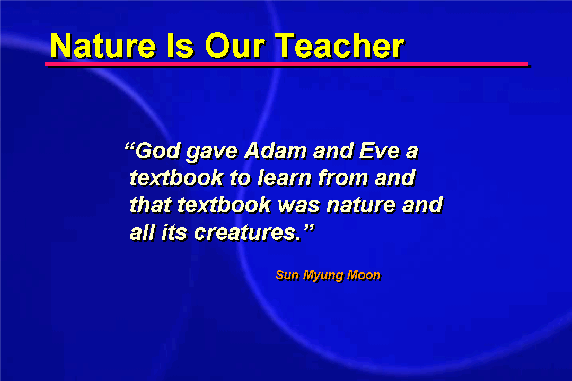
Some creatures live in such an extremely sacrificial way that we may find it shocking.
Reverend Moon himself often expresses his amazement at the life pattern of the salmon, which returns from many years of life in the ocean to the river in which it was born, and then dies after its eggs hatch. Through the parents' sacrifice the young salmon are provided with food, and thus the next generation will survive.
Thus, nature is the textbook that God prepared for His children's education. By studying it we can learn many truths about our world and how God intended for us to live.
Adam and Eve Were to Learn from Creation
From Sun Myung Moon's Philosophy of Education, Seoul, Korea: Sunghwa Publishing Company, 2002.
Adam and Eve were born to be God's children and grow up under His protection. They grew bigger as they grew older. The more their intelligence grew, the more they learned about the world of creation. They were supposed to learn why God had created it. They were also supposed to learn from the world of creation.
Everything that happened in the world of creation was supposed to be a chapter in a textbook for Adam and Eve to learn and to live by. It was supposed to be a museum and provide examples of ideal life for the perfected Adam and Eve.
God Could Not Educate His Children
From Sun Myung Moon's Philosophy of Education, Seoul, Korea: Sunghwa Publishing Company, 2002.
God could not educate His own children, Adam and Eve, in how to be good children. God could not educate them in how to be a good brother and sisters. That caused God sorrow. God also could not educate His children in how to make a good couple as husband and wife. He could not teach them how to love each other with His love as their central focus.
God could not educate His children in how to be good parents. He failed to do all that. Were Adam and Eve God's children? Weren't they also brother and sister to each other? Weren't they also supposed to be a true husband and wife centering on God? Weren't they to be parents and have their own children later? But God could not give any kind of education to them at all.
Because Adam and Eve failed to receive the right education from God, they could not complete the family of God's ideal of creation.
So, we must educate people to create families centering on true love. We must teach people how to be God's children, brothers and sisters, husbands and wives and parents. That is the way we can build families and eventually create an ideal nation and ideal world.
D. How God Has Educated Humankind
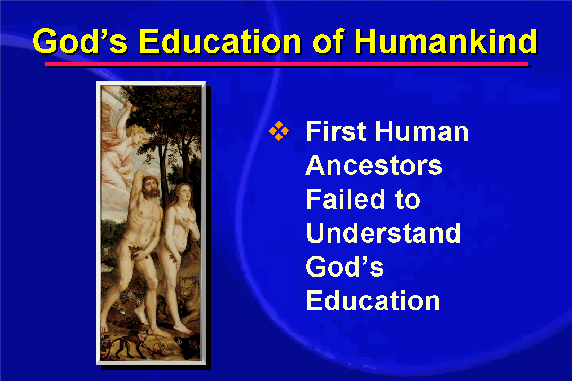
Originally, the first human ancestors should have received education from God and then imparted this knowledge to all their descendants. Reverend Moon explains that Adam and Eve did not understand God's teachings and thus they remained in ignorance when they established their family. As a result, their children and all their descendants to this day remain ignorant of many of God's principles and have therefore been unable to establish a true world of peace.
God Has Been Our Parent and Teacher
From Sun Myung Moon's Philosophy of Education, Seoul, Korea: Sunghwa Publishing Company, 2002.
How has God carried out the providence for the restoration so far? He has been guiding us as a parent. He has also been educating ignorant people throughout history as a teacher.
Then what does God want from educating us as a parent and as a teacher? He wants to bequeath His position of parent and teacher to us. That is the ultimate purpose of salvation.
That was the purpose of creation before the Fall. We were supposed to fulfill the role of parent and teacher on God's behalf.
When God created the cosmos, He loved us from the position of our parent. Then He wanted to educate us so that we could realize the ideal of love by learning the principled course. Had we become mature, God wanted to tell us, "You now become the masters of the cosmos in the role of parents and teachers forever." God originally wanted us to be the masters of the cosmos.
God's purpose in educating humankind has been to overcome the problem of ignorance so that we can fulfill our potential as His children and take responsibility for all of creation in the position of masters of the cosmos.
Reverend Moon has revealed that God's method of restoration is to sacrifice those who seek goodness so that future generations will prosper. Thus, truth has been imparted to humanity through the sacrificial lives of saints who strove to do God's will at great personal cost.
God Educates for Future Generations
From Gathering for Reading and Learning Series, Volume 6: The Way for Students, Washington DC: FFWPUI, 1998.
A church exists for the purpose of God, and a school for the future generations. God's will always rests on the future generations. Through the sacrifice of an individual person He seeks for great happiness of the descendants.
He knows that a great nation and world for the future generation will come, through the sacrifice of this generation. God has put His heart and soul into the work of teaching people to be able to fulfill their duties.
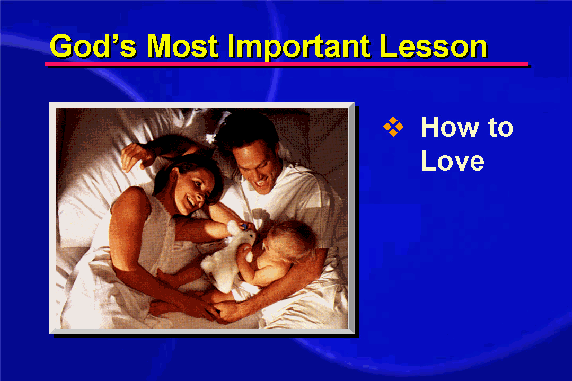
The most important lesson that God has been trying to teach us is not intellectual or practical knowledge, for those are misused by people whose motivation is self-centered. Rather, it is how to give and receive love. When we learn to practice true love, we resemble God.
God Has Been Teaching about Love
From Sun Myung Moon's Philosophy of Education, Seoul, Korea: Sunghwa Publishing Company, 2002.
God has carried out His work in history with a heart of love to save humanity. Because His motivation to save us has been love, He had to educate people about love more than intellectual knowledge, external truth, the workings of society or the world.
When God teaches us, He surely must do so focusing on what is most essential. In the parent's position, what is the most essential thing that He could teach humanity? It is nothing but love.